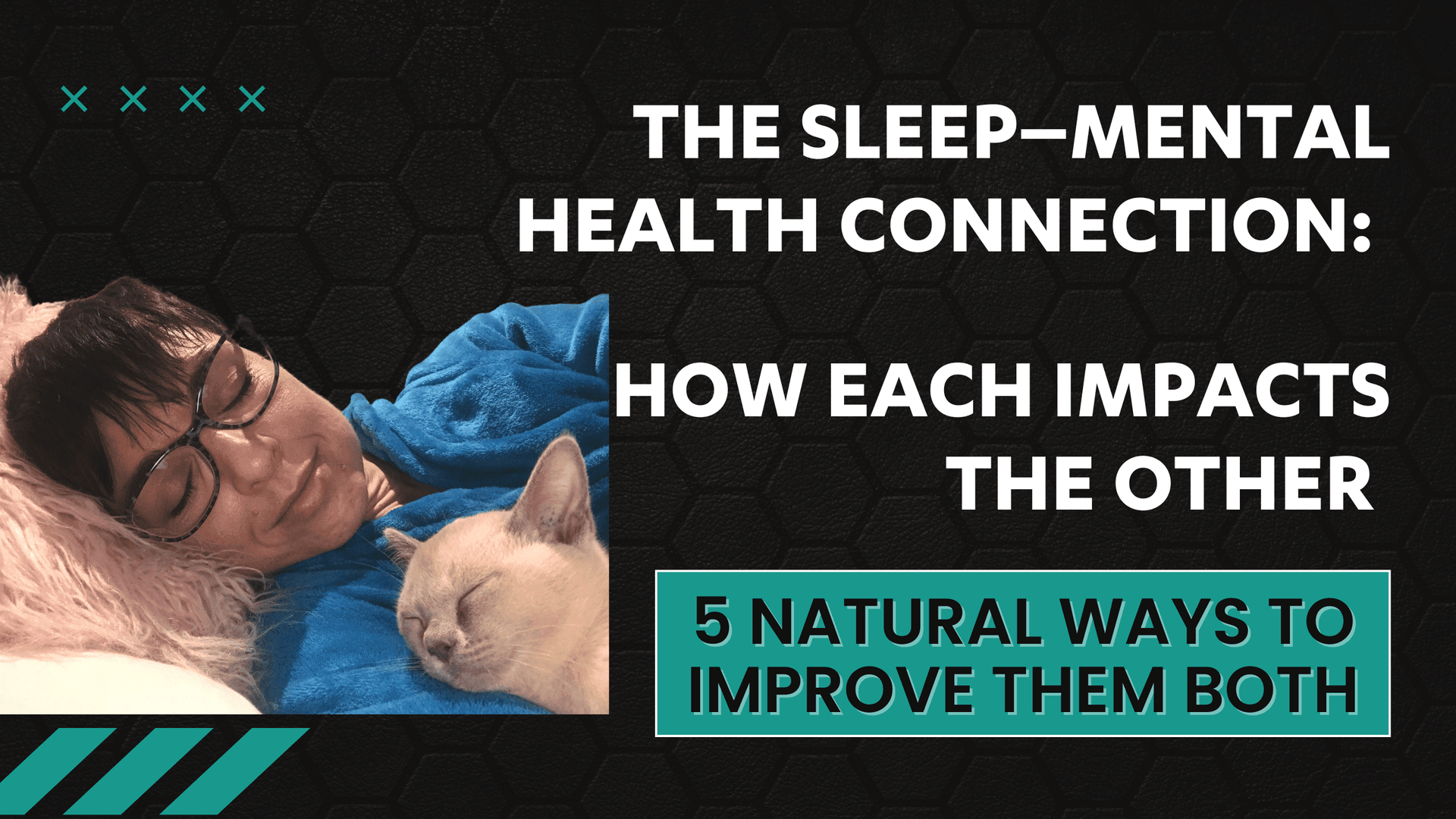
The Sleep–Mental Health Connection: 5 Natural Ways to Improve Them Both

In our fast-paced, overstimulated world, sleep and mental health are two areas where many people find themselves struggling, and often, they don’t realise just how closely the two are connected. Poor sleep doesn’t just make you feel groggy; it can significantly affect your mood, memory, emotional resilience, and long-term mental wellbeing. On the flip side, mental health issues like anxiety, depression, and chronic stress can make sleep elusive, leading to a frustrating cycle that’s hard to break.
Understanding the bidirectional relationship between sleep and mental health is essential. Just as lack of sleep can contribute to mental health challenges, improving sleep can actually serve as a natural therapeutic intervention for the mind. And vice versa, tending to your mental health can profoundly improve the quality of your sleep.
Let’s explore this intricate relationship and dive into five natural, holistic strategies to help support both mental clarity and restorative sleep, plus one powerful bonus tip you might not expect.

Sleep is not a luxury, it's a biological necessity. During the different stages of sleep, particularly deep sleep and REM (rapid eye movement) sleep, your brain performs critical housekeeping tasks. It processes emotions, consolidates memories, regulates hormones, and clears out metabolic waste (including harmful proteins linked to neurodegeneration). For more information on the importance of sleep for cell regeneration and anti-ageing check out our blog here.
When sleep is disrupted or consistently poor, these processes are compromised, leading to:

Increased emotional reactivity
Higher levels of cortisol (the stress hormone)
Impaired cognitive function and decision-making
Reduced resilience to daily stressors
Heightened risk of anxiety and depression
Even one night of poor sleep can impact your mood the next day, but chronic sleep deprivation is associated with a significant risk of long-term mental health issues, let alone a myriad of other physical health concerns too.
In fact, insomnia is not just a symptom of depression and anxiety, it can also be a predictor of them. People with persistent sleep issues are much more likely to develop mental health disorders in the future.

On the flip side, if you’ve ever tried falling asleep while your mind races with worry or sadness, you already understand how mental health can hijack your sleep.

Conditions like anxiety, PTSD, depression and even mild chronic stress can trigger:
Racing thoughts at bedtime
Difficulty falling or staying asleep
Early morning waking
Nightmares or restless sleep
This is largely due to an overactive sympathetic nervous system (your “fight or flight” response) that keeps the body in a state of alertness, even when you’re physically exhausted.
This creates a damaging loop: poor sleep worsens mental health, and poor mental health disrupts sleep.

Fortunately, there are gentle, effective, and natural strategies that work to calm the nervous system, promote emotional balance and invite restful sleep. Here are five research-backed methods that work synergistically for both sleep and mental health:


Adaptogens are natural herbs that help the body adapt to stress, regulate hormones and bring the nervous system back into balance. Two of the most powerful adaptogens for both sleep and mental wellbeing are:
Ashwagandha: Known to reduce cortisol levels, ease anxiety, and improve sleep quality. It supports the adrenal system and is especially helpful for people experiencing burnout or emotional exhaustion.
Passionflower: Often used for anxiety, passionflower enhances GABA activity in the brain, a neurotransmitter that promotes relaxation and sleep.
These herbs gently encourage your body to shift from a stressed, wired state into a relaxed, restorative one, making them ideal for use before bed and even during the day to stabilise mood.
✨ Try This: Lights Out™ Sleep Lotion is a powerful, all-natural topical formula that combines both Ashwagandha and Passionflower, alongside other therapeutic botanicals like Chamomile, Valerian, Lavender, and Reishi Mushroom. Applied to the skin before bed, it helps ease tension, calm the mind and support a restful night, naturally.

Your brain thrives on rhythm and routine. A predictable bedtime ritual can send powerful signals to your body that it’s safe to switch gears and rest. Plus, the psychological benefit of a calming evening ritual can help ease anxiety and anchor your mind in the present.
A few natural ideas:

Dim the lights 1–2 hours before bed.
Practice 5 minutes of deep breathing, gentle yoga or journaling.
Take a warm magnesium-infused SOulSoak bath and enjoy the benefits for both your mind and body.
Listen to calming music or a meditation track. Check out our guided sleep meditation here.
Use Lights Out™ Lotion with sleep inducing herbs and magnesium.
This routine doesn't just prepare you for sleep, it becomes a grounding, mindful practice that helps reduce overthinking, quietens the mind and promotes emotional regulation.

Blood sugar isn’t just a physical health issue, it has a direct impact on your mood, energy, and sleep. Spikes and crashes in glucose can cause irritability, anxiety, and wakefulness in the night.

To help stabilise both mood and sleep:
Avoid sugary snacks and processed carbs close to bedtime.
Include a source of protein or healthy fat in your evening meal.
Herbal teas like cinnamon or chamomile can support blood sugar balance.
For some people, waking up overnight may be due to a blood sugar crash. Stabilising your blood sugar throughout the day, and avoiding late-night sugar, can make a big difference in both emotional stability and uninterrupted sleep.

Getting morning sunlight is one of the simplest and most powerful ways to regulate your circadian rhythm, which governs your sleep-wake cycle and mood-related hormones like serotonin and melatonin.
Here’s how light exposure helps both mental health and sleep:

Morning sunlight boosts serotonin, the "feel-good" neurotransmitter.
Evening darkness triggers melatonin, the hormone that prepares the body for sleep.
Try to get 15–30 minutes of natural light exposure within the first hour of waking. In the evening, reduce blue light exposure by dimming lights, using amber-tinted glasses, or turning off devices an hour before bed.
Bonus: Natural daylight also supports vitamin D synthesis, which plays a role in mood regulation and immune health.

Magnesium is known as nature’s calming mineral, and for good reason. It plays a vital role in over 300 biochemical reactions, many of which impact your nervous system.

Low magnesium levels have been associated with anxiety, irritability and sleep disturbances. Increasing your intake can help:
Relax tight muscles and reduce physical tension.
Calm the nervous system by supporting GABA receptors.
Improve the depth and quality of sleep.
You can increase magnesium through:

Food sources: Dark leafy greens, nuts, seeds, bananas, and dark chocolate. Our PlantEm Essentials NourishEm Greens whole food powder, packs a huge Magnesium hit in just a single dose daily.

Topical magnesium: Absorbed directly through the skin using creams like Trauma Relief Cream and Kirofix® Injury Relief Lotion or our Lights Out™ Lotion (especially given it’s combined with sleep-supportive herbs).

SOulSoak RELAX Bath Salts: Relax in both mine and body while soaking up transdermal magnesium as well as over 80 other essential elements and minerals, just by soaking in the tub or with your feet in a foot spa. Let alone the extremely relaxing essential oils Rose Geranium, Bergamot and Lavender that envelope your senses as soon as you open the packet.

You might be surprised to learn that your gut and your brain are in constant communication via what’s called the gut-brain axis. In fact, around 90% of serotonin (your "feel-good" neurotransmitter) is produced in the gut, not the brain. When your gut health is compromised, so is your emotional regulation, cognitive clarity and, of course, your ability to sleep soundly.

Imbalances in the gut microbiome have been linked to:
Anxiety and depression
Brain fog and low mood
Insomnia and disturbed sleep
Low melatonin production
Feeding your gut the right kind of nourishment, specifically prebiotics that help beneficial bacteria thrive, is a foundational way to improve both mental health and sleep quality.
🌱 Try This: FeedEm Prebiotics from our PlantEm Essentials range is a targeted prebiotic formula designed to feed and nurture your unique gut microbiome. By helping good bacteria flourish, it supports healthy digestion, better mood balance, and even improved sleep through its effect on neurotransmitter and hormone production.

We often try to compartmentalise our health, treating sleep as one thing and mental wellbeing as another. But the truth is, they are inextricably linked. Sleep is the brain’s reset button, while your mental state is the lens through which you experience your life, but both rely heavily on one another to function optimally.
The good news is that by taking a natural, holistic approach, you don’t have to choose whether to focus on sleep or mental health. You can support both with a few intentional lifestyle shifts, calming rituals, and plant-based allies.
Whether it’s a nourishing wind-down routine, a sleep-enhancing lotion infused with calming herbs, or a renewed connection to the rhythms of nature, small steps can lead to profound change.
After all, when your mind is at ease, your body knows how to rest, and when you rest deeply, your mind can begin to heal.









